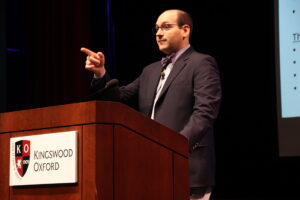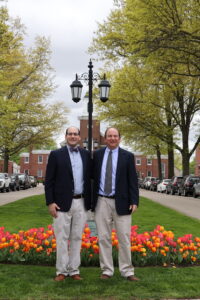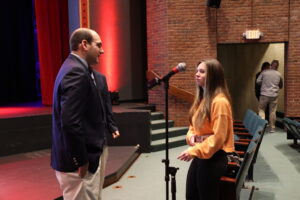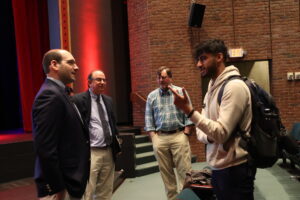May 08, 2023
Stroud Science Symposium Features Alumni Epigeneticist
Myles Alderman III ’10, a Ph.D. candidate in Yale’s Department of Genetics, was this year’s Stroud Science Symposium Speaker. His research is directed toward understanding the epigenetic regulations of embryogenesis, a curiosity fostered by Fritz Goodman. Although this topic is complex, Alderman conveyed the information to the audience with layman’s terms and good humor.

Epigenetics includes the study of how new organisms come about following the fertilization of eggs by sperm, which involves modifying genes so that they can be expressed or silenced. “The main scientific question in my research is how epigenetic mechanisms drive mammalian embryogenesis, the creation of embryos for mammals, and how we can use those mechanisms to improve pregnancy outcomes,” Alderman said. Ultimately, the scientists are looking for ways to have more healthy babies born, he said.
Alderman described his task in the lab as a game of intellectual Battleship where the scientists have some information and make guesses to see what hits. Many of these experiments fail, so Alderman stressed to the students that tenacity is a key ingredient to becoming a scientist. “We are failing a lot,” he said. “The most important part of the scientific method isn’t the steps but teamwork and perseverance. It’s perseverance that allows us to move this research forward.”
Alderman’s quest began as a student at KO with Upper School Science Chair Fritz Goodman. He asked Goodman how a cell knew what it was meant to become. Goodman responded with information about transcription factors (DNA control elements) and gene expression in cells. “I said, ‘Well, how do cells know how to organize transcription factors in these cells precisely?’ He said something I would never forget: ‘Well, we don’t know yet.’ And that set me on a journey.” 
Alberman gave a primer about cell life and structure and explained that every cell in the body shows the same DNA sequence, and there are between 450 and 4000 different types of cells in the human body. Cell function is dependent upon individual protein levels. A difference in transcription leads to a difference in protein levels. The study of epigenetics is understanding how cells alter their function – through the regulation of transcription – without altering their DNA sequence. DNA wraps around proteins called histones, allowing the combination to condense and effectively make the DNA unreadable. By modifying the histones, you can make the reading more accessible. “If you methylate DNA (which involves attaching a carbon bound to three hydrogen atoms), you’ll cause it to wrap more tightly around histones, and if you remove that methylation, it will open it up.”
Alderman explained the importance of this in his research with a placenta and epigenetic regulation. He examined an environmental factor that impacts during a critical gestation window by using BPA, a toxin found in cans, water bottles, and store receipts. BPA is so prevalent that 93% of human urine contains BPA traces.
He said estrogen and BPA have similar chemical structures, which can combine with estrogen receptors in the human body. The BPA binds to the estrogen receptor and signals to the cell that estrogen is present. BPA crosses the placenta to the embryo very easily but cannot make the return trip from the embryo to the placenta after it binds to estrogen receptors. As pregnancy advances, the concentration of BPA increases to the point that it is higher in the amniotic fluid than it is in the mother’s blood.
Alderman injected pregnant mice with BPA and monitored how the offspring’s uterus functioned at the two-week development period (before puberty) and again at six weeks (after puberty when there is more estrogen in the body) to see how this one-time exposure impacts adult mice. The scientists found over 1,700 sites on the genome that had differences in methylation, and 93 percent of the genes that had these changes were bound to the estrogen receptor. Then, they looked at how genes responded to estrogen. By giving the animal BPA as an embryo, this gene had an inverse response to estrogen. In response to estrogen, the expression of a particular gene should decrease, but what wound up happening was that it went up. The scientists inverted the response to estrogen. This real-world example shows how exposure to a toxic compound can impact the epigenetics of people far after they are exposed to it. Due to studies like these, BPA has been banned in baby products and products that are marketed toward pregnant women.
Following the discussion, students asked follow-up questions. 

Alderman earned his bachelor’s degree in biology in 2014 from Kenyon College. He received the Gruber Science Fellowship at Yale, the National Science Foundation’s Graduate Fellowship Research Fellowships Program (NSF GRFP), and the Lo Graduate Fellowship for Excellence in Stem Cell Research.
News Main News
